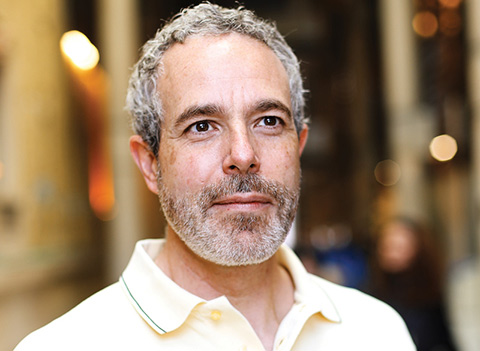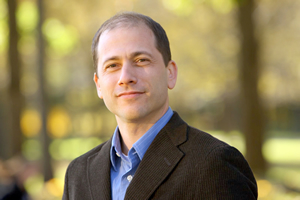Brendan Frey, a U of T professor of electrical and computer engineering, has spent more than a decade developing machines that can identify dangerous, disease-causing mutations in human DNA. While most of his career has been spent doing basic science, he and his research team have now founded Deep Genomics, a technology startup that simulates how mutations in our genetic code translate into health and illness.
Genetic mutation strongly affects the likelihood of getting cancer, diabetes and many other diseases. But the mechanisms by which genetic variation turns into ill health are still poorly understood. Frey’s team feeds billions of measurements into a machine-learning system – a type of artificial intelligence – to simulate the entire process, beginning with mutations in the genetic code right through to the molecular changes that potentially lead to illness.
“After the human genome was sequenced, we had the text, but we didn’t know how to make sense of it,” says Frey. “Now we have a ‘deep genomics’ engine – a machine-learning system where you feed in the genetics and it will tell you what’s going to happen in the cells.”
Some companies already offer similar-sounding genetic services, analyzing a person’s individual genome and assessing their risk for certain genetic diseases. But most such services are based on coarse statistical correlations that can say little more than, “People with gene mutation A are more likely to get disease B.”
These correlations are inaccurate because they don’t explain if and how a genetic mutation actually causes the disease. Nor do they look at gene interactions to determine whether one mutation is affected – for better or for worse – by others in the same genome. Nor do they identify categories of mutation. Andrew Delong, a research scientist and colleague of Frey’s, says the Deep Genomics approach can do all of these things.
Think of a traffic-accident investigator with primitive knowledge of auto-mechanics analyzing a dozen car crashes. In every case, the brake line has been cut, but each time in a different place. The investigator might identify each cut as a unique issue, never recognizing that all the cars crashed because the brake line has an important function and that cutting it anywhere causes the vehicle trouble. Using AI, Deep Genomics can identify the higher-level pattern. “Machine learning allows us to take all the data available and extrapolate many years ahead, predicting the effects of mutations that no one has had a chance to study,” says Delong. “This is a powerful system for diagnosing disease and designing therapies.”
Deep Genomics builds models based not just on genetic information, but also on biological data about what happens on a molecular level to cause certain diseases. For instance, a gene mutation can alter the behaviour of a specific protein. Or it can affect the RNA that regulates protein production and carries information within a cell. Or it can cause some other problem entirely. Deep Genomics connects the dots between gene mutations, molecular outcomes and disease, allowing researchers to zero in on how best to treat the disease.
Deep Genomics’ algorithms can also deal with the complexity behind many genetic diseases. Very often diseases are caused by multiple mutations, all of which have to be present for a disease to manifest. Mutation A doesn’t make you sick. Mutation B doesn’t make you sick. But mutations A and B together make you sick. (Or even, mutation A will make you sick, but not if you also have mutation B.)
Sometimes hundreds of gene mutations need to be looked at to detect a complex disorder such as autism or diabetes. “We put it all together into one big system,” Frey says. “Our ability to interpret the genome is growing very rapidly now. I think in 10 years we’re going to understand most of what the genome does, which mutations cause which diseases and why. Even if we could just address 10 per cent of genetic disease more accurately, it would have a huge impact on people’s lives.”







No Responses to “ Can Artificial Intelligence Solve the Mystery of Genetic Disease? ”
Great research that's badly needed! Genetic diabetes runs in my family and my lifestyle was not able to stop it. I succumbed to the gene at the age of 43. I am still alive at 92 and my doctor tells me that I have done well to last that long.